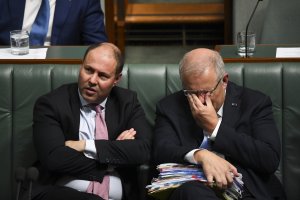Australian Government announces it is in Recession

.
.
.
.
.
Australian Government announces it is in Recession
After 30 years Australia is now in its first recession in three decades, it’s been a hell of a ride for Australians suffering bushfires, drought and then the Covid-19-Virus crisis shutdown having a devastating effect on the nation's economy.
The Treasurer Josh Frydenberg said Australia’s economy shrunk by 0.3% in the March quarter, with the Australian Bureau of Statistics (ABS) disclosing that the figures only captured the beginning of the health crisis.
The Treasurer said the expectations for the June quarter is forecast to be much worse, with the economy experiencing the full impact of the Covid-19-Virus crisis related restrictions.
A recession equates to, two consecutive negative quarters in which a nation’s GDP falls so Australia is looking up the barrel of a rough ride.
“In response to this 1 in 100 year global event, we put in place a series of health measures that have hit the economy hard,” Frydenberg said on Wednesday.
Over the past 12 months Frydenberg said the economy grew 1.4%, the figures show it reflects the weakest performance since the 2009 global financial crisis.
Building approvals fell in April with the residential construction sector facing a huge uphill battle after a large decline in net overseas migration, with and with a government stimulus package soon expected to be announced.
The latest ABS figures show dwelling approvals fared better than expected in April, although building approvals data is not expected to reflect the Covid-19 impact until August. Total dwellings approved dropped 1.8% in April, driven by an 8.9% drop in approvals for private dwellings such as apartments, townhouses and semi-attached homes, and house approvals increased 2.7% in April.
HIA chief economist Tim Reardon says the building approvals data released on Wednesday relates to projects lodged with local councils well before the impact of the pandemic. All states recorded a monthly increase in approvals with the exception of New South Wales which declined by 29.9% during April driven by a fall in multi-unit approvals.
.
